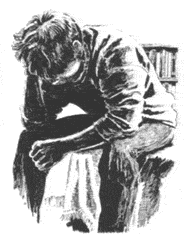DEPRESSION AND OTHER ILLNESSESS OF THE SOUL

Until the coming of AIDS depression was the uncontestable titleholder of the “Illness of the Century.” Nevertheless, even stripped of this useless honor, it calmly continues to progress globally, together with several other illnesses termed as mental diseases.
The person struck by depressive symptoms more or less follows a standard procedure in his search for help. He leaves his first medical consultation assigned with the task of undergoing a battery of clinical exams, which a few days later will invariably demonstrate that he is in perfect health, or that the eventual glandular dysfunctions have no relation with the present symptoms.
The problem could have only originated from a brain chemical imbalance. The doctor tries to explain to his patient with depression - at this stage already with a certain degree of anxiety and anguish - that the levels of serotonin are abnormally low in the synapses and that there is an undesirable retention of that and other neurotransmissions by the neurons, hindering the exchange of electrical impulses among them.
While the new depressed patient tries to imagine what is wrong with him, he continues rocking back and forth in silence, with the desire of conviction that he really understands everything the doctor is saying. One way or the other he ends up feeling comforted by this unintelligible diagnosis, because to him this is proof that his illness is perfectly understood by medical science. The cure alone would be a question of time, and the only thing left to do is to regularly take the certain amount of antidepressants three times daily.
Here I should make it clear that antidepressants and anxiety pills really are chemical balms, when they act partially or totally by blocking some of the symptoms. It is not by chance that such aid is precisely available at this time, when people are literally being shaken by psychic shocks.
All the same, the easing of the symptoms and the improvement in the quality of life obtained through pharmaceutical drugs are no proof that medical science is effectively aware of these diseases at all, much less still that they are aware of their real causes as well. As in all the other scientific areas, here also it is only capable of analyzing and concluding on the external effects that are physically measurable and understandable. So, in spite of the praiseworthy efforts and recognized successes in the treatment of the bodily symptoms, medical science cannot properly arrive at the cause of these illnesses, as they are found in the individuals' soul. An impossible etiology to be detected by any tool be it a stethoscope or a magnetic resonance apparatus.
Depression, anguish, bipolar disturbances, panic syndrome and phobias, are all diseases that originate in the psyche. Therefore, it is through the treatment of the soul that the cure should be sought, without neglecting, as already mentioned, the treatment of bodily symptoms as well.
But do not imagine that one can treat the soul through prescriptions given by witchdoctors and faith healers, neither through hypnotic sessions nor by internally stripping oneself on the psychoanalyst's couch. And there are many of these mind professionals and psychiatrists too that do not even believe in the existence of the soul. And worse still the real meaning of the word “psychiatrist” is “doctor of the soul.” Doctors of the soul that do not even believe in its existence…
A depressed person should before all else change his internal tuning and primarily this is done through changing his way of thinking. His thoughts should always be directed towards doing good, naturally as a noble and good human being does. Certainly it is not necessary to go into detail what negative thoughts really are; it is enough to classify this category as all those that are unworthy of man, which immediately oppresses the generator and shapes the environment around him.
There is in this voluntary choice of types of thoughts much more than one can imagine at first sight. The human holds the prerogative of choice in thinking good or evil, however, he is unappealably subject to the consequences of this, as well as everything that emanates from him. In respect to this he has no defense. Everything that he inserts into creation, be they actions, words or even thoughts, always comes back to him like matured fruit of an automatic crop. If what he sowed was good, he will pick sweet and succulent fruit. If it was bad… then he will have to pick rotten and poisonous ones.
Here I do not mean to say that one should make an effort to have good thoughts. Then it would obviously be an unnatural effort with little profit from it, as with anything that is undertaken unilaterally and artificially. This is, in fact, the principal flaw with the self-help books that teach positive thinking.
A person that suffers from depression should indeed make a great effort to change his manner of being through a continual persevering effort until he gets to the point where he is not able to generate bad thoughts anymore. You can be sure that no doctor would censure someone from following such a simple treatment, as long as, evidently, they do not abandon the traditional therapy. If you undertake this with a pure heart and a sincere soul and also make a serious effort you will see the thick dark veils that isolate you from the joy of living disappear progressively. And you will begin to discover, through your own experiences, the meaning of the word peace.
Roberto C. P. Junior